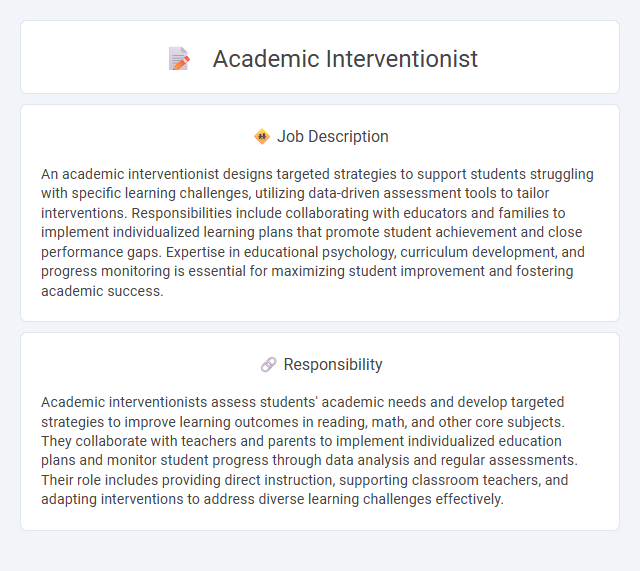
An academic interventionist designs targeted strategies to support students struggling with specific learning challenges, utilizing data-driven assessment tools to tailor interventions. Responsibilities include collaborating with educators and families to implement individualized learning plans that promote student achievement and close performance gaps. Expertise in educational psychology, curriculum development, and progress monitoring is essential for maximizing student improvement and fostering academic success.
Individuals with strong communication skills and a passion for helping students overcome learning challenges are likely to be suitable for an academic interventionist role. Those who can remain patient and adaptable in diverse educational settings may find this job aligns well with their strengths. Candidates lacking empathy or the ability to work collaboratively might face difficulties succeeding in this position.
Qualification
An Academic Interventionist typically requires a Bachelor's degree in Education, Special Education, or a related field, with many positions preferring a Master's degree or advanced certification in intervention strategies or literacy. Professional experience in classroom teaching and proficiency in data-driven instruction methods are essential for effectively identifying and addressing student learning gaps. Strong skills in assessment, individualized education plans (IEPs), and progress monitoring are critical qualifications for success in this role.
Responsibility
Academic interventionists assess students' academic needs and develop targeted strategies to improve learning outcomes in reading, math, and other core subjects. They collaborate with teachers and parents to implement individualized education plans and monitor student progress through data analysis and regular assessments. Their role includes providing direct instruction, supporting classroom teachers, and adapting interventions to address diverse learning challenges effectively.
Benefit
Academic interventionist roles probably offer significant benefits such as improving student learning outcomes and fostering educational equity. This position might provide opportunities for professional growth through specialized training and collaboration with educators. Health benefits and flexible scheduling may also be expected parts of the compensation package in many educational institutions.
Challenge
The role of an academic interventionist likely involves addressing diverse student learning challenges that require tailored instructional strategies and timely support. This job may demand strong problem-solving skills to identify barriers to student success and implement effective interventions. Managing varying student needs and collaborating with educators and parents could pose significant challenges in fostering academic growth.
Career Advancement
Academic interventionists play a critical role in identifying and supporting students with learning challenges, using data-driven strategies to enhance educational outcomes. Career advancement in this field often involves pursuing advanced certifications, such as a Master's degree in education or specialized credentials in special education or literacy intervention. Leadership opportunities, including becoming a lead interventionist, curriculum specialist, or educational consultant, are accessible through continued professional development and demonstrated success in improving student achievement.
 kuljobs.com
kuljobs.com